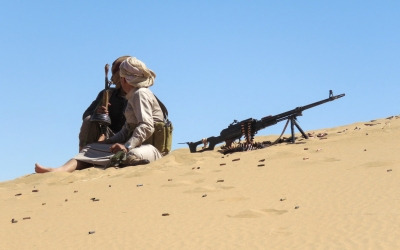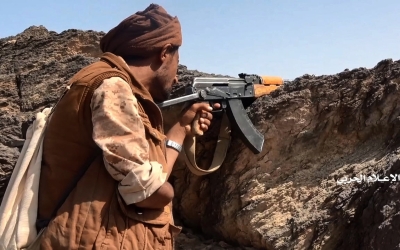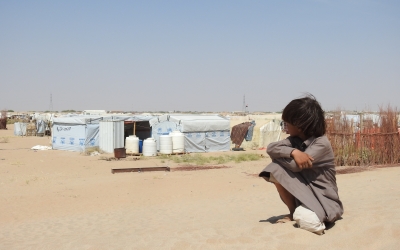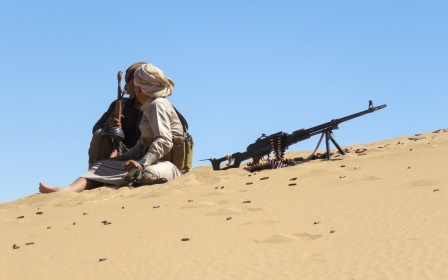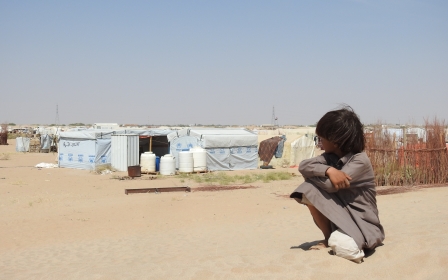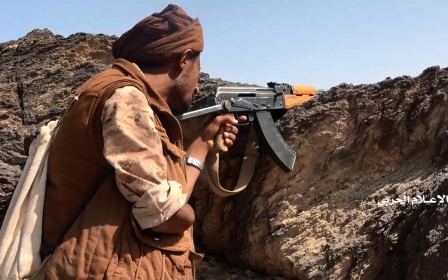Yemen: Saudi-led air strikes last line of defence as Houthis advance in Marib
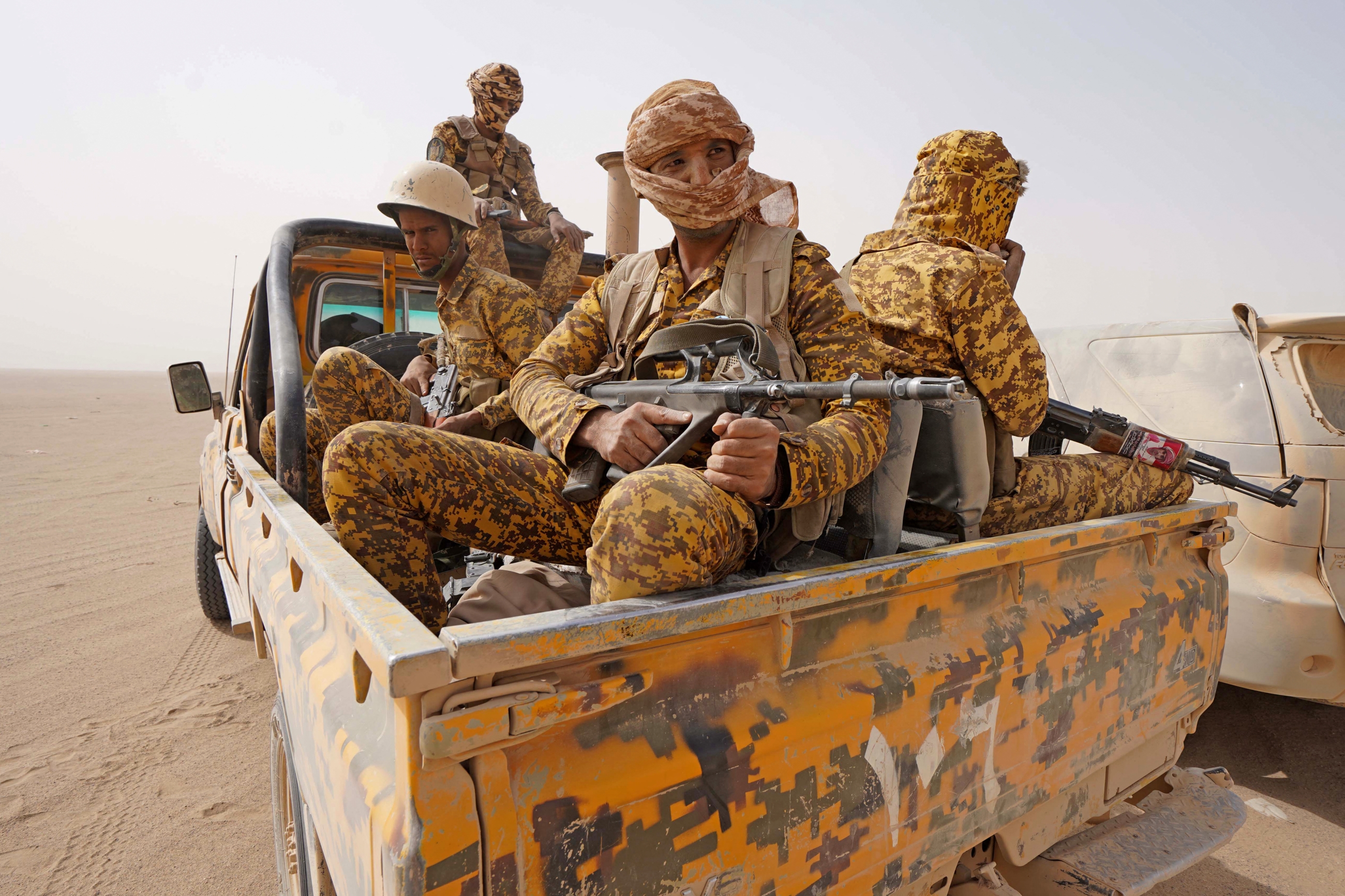
Houthi rebels have been fighting fiercely in the vicinity of Yemen's Marib city during the past few days as they launched heavy attacks on several fronts, with the main focus around Al-Balaq mountain, which overlooks the city.
The Houthis have made major advances during the past couple of months after striking a deal with tribal leaders from the Murad tribe.
If the Houthis take Al-Balaq, it will be much easier for them to target fighters in Marib from the mountain and even take control of the city.
However, critical recent Saudi-led air strikes have so far managed to stem the Houthi advance and given hope to pro-government forces.
Marib, considered one of the most significant historic sites on the Arabian Peninsula, according to Unesco, is surrounded by rugged mountains and valleys.
It is said to have been the capital of the ancient Saba kingdom, best known for the legendary Queen of Sheba.
The Houthis have been trying to take over the oil-rich province since 2015, and the city of Marib is now the last stronghold of pro-government forces in north Yemen.
Hundreds of Houthi fighters and pro-government forces have been reported killed in fighting in recent months.
Waves of Houthis
"The Houthi militia have been randomly sending fighters in groups to the front lines, and they don't care about themselves, just but about advancing," Fawaz, a pro-government fighter in Marib, told Middle East Eye.
"The Houthi militia also have good weapons, as they looted the weapons from the army in 2014, but they don't even think before they go to the front lines, as the shelling and air strikes kill them in huge numbers."
In contrast, said Fawaz, who did not wish to give his full name, the pro-government forces care about their own lives, and when they advance or confront an attack they take the lives of their fighters into consideration.
"The shelling and air strikes kill the Houthis in dozens, and in few hours another group come to their deaths," he said.
"It is true that they [the Houthis] advanced in some areas in Marib, but they won't take the city, as the air strikes kill any fighter who tries to advance, and we on the ground also confront any advance."
'Wait for the green light'
Saudi Arabia leads a military coalition that intervened in Yemen in 2015 to restore the government of President Abd Rabbuh Mansour Hadi, which was kicked out of power in the capital, Sanaa, by the Houthi rebels in 2014.
Countries in the coalition include the UAE, Bahrain, Egypt and Sudan.
Fawaz said the coalition had been absent from some battles during the past five years, but he confirmed that the latest air strikes are playing a major role in preventing the Houthis from advancing to Marib city.
"A big thank you to the Saudi-led coalition for their support in this battle, and we hope the air strikes continue to back us, not only in defending Marib city but also in liberating the whole province from the [Houthi] militia," he said.
Fawaz added that military reinforcements and new fighters were joining the battle in Marib and that he believes not only will the Houthis not take the city but that pro-government forces will recapture some areas.
"Our plan is not to defend Marib city but to recapture all areas in Marib, and we wait for the green light from our leadership to do so," he said.
'We will take over Marib city'
A Houthi supporter in Sanaa pointed out that the rebels were fighting several countries in Marib and not only the pro-government forces.
"We are fighting the aggressor [Saudi-led coalition] countries backed by America and not only their mercenaries [pro-government fighters]," he told MEE on condition of anonymity because he was not authorised to speak to the media.
"Although they use all kinds of weapons against Yemenis, the right will win, and we will take over Marib city and other areas soon."
Hamzah, a resident of Marib, said the Houthis have been advancing towards the city and that air strikes, shelling and military reinforcements would be unable to stop their advance.
"Military vehicles are moving in the city, and we see more [pro-government] fighters arrive every day," he told MEEE.
"Also we hear the explosions of air strikes and shelling, but that hasn't stopped the Houthi advances towards the city.
"The Houthis are nearer now to the city, and even during the few last days they took over new areas, but not large ones."
Civilian fears
Hamzah said there were more and more displaced families arriving in the city, and they tell about their suffering and what they witnessed on the front lines.
"The displaced families who arrive at the city tell us about the new advances of the Houthis, and this new displacement wave is a signal of the [success of the] Houthi advances, so we are worried that battles may arrive at the city soon," he said.
Hamzah said he was worried not only about the fighting moving closer to the city but also about missiles targeting civilians beforehand.
"We know that missiles arrive before battles, so, if the Houthis advance more, they may start to target the city, and that itself is a big threat for us," he said.
"We hope that the warring sides reach an agreement and avoid targeting civilians."
In late October, Basheer Omar, a representative for the International Committee of the Red Cross in Yemen, told The National: "Marib city hosts more than two million internally displaced people [IDPs] - almost 70 per cent of the IDPs in Yemen.
"If the conflict reaches the city, then it would be a disaster for them. They will be faced with very difficult choices."
Tribal backing
Mohammed Ali, a veteran journalist who has followed the battles in Marib, said it was still unclear who would prevail in the fighting and that it depended which of the warring sides had the support of tribal leaders.
In October, the Houthis advanced in Marib after a deal with leaders from the Murad tribe, one of the biggest tribes in Yemen.
"The real advances of the Houthis in Marib came after agreements with the tribal leaders, and if there is a new agreement now they will take over the city," Ali told MEE.
"But if the tribes keep fighting with the government, it will be difficult for the Houthis to take over the city."
Ali said the Saudi-led air strikes had played a pivotal role in confronting the Houthi advances, stating that the air strikes were effective in open areas like the desert but not in cities.
Middle East Eye delivers independent and unrivalled coverage and analysis of the Middle East, North Africa and beyond. To learn more about republishing this content and the associated fees, please fill out this form. More about MEE can be found here.


